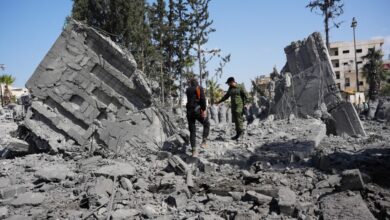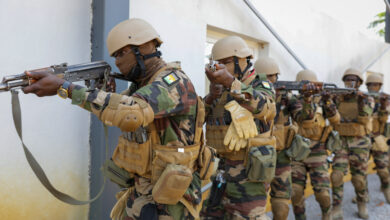Nigeria repatriates 3 orphan children of ISIS adherents in northeast Syria
A group of three orphans born to Nigerian Islamic State adherents were handed over to Nigerian officials in northeast Syria, the first repatriation of children of Africans who traveled to join ISIS.
The children, aged 8, 6, and 4, were handed over in Qamishli to Musa Habib Marika, a representative from the Nigerian Ministry of Foreign Affairs on Thursday, September 5, the Syria-based Rojava Information Center said.
A Nigerian foreign ministry delegation visited the autonomous region of North and East Syria on Tuesday, where they met with the co-chairs of Department of Foreign Affairs , Abdulkarim Omar and Emel Dada, as well as the chair of the Women’s Committee, Cihan Xidro.
At the meeting the Nigerian delegation requested the handing over of the three Nigerian orphans, all from the same family, whose parents had joined ISIS.
The RIC said it was the first such repatriation to an African country.
Marika requested the names of all Nigerian citizens in prisons and camps in northeast Syria, ANHA reported on Thursday. Nigeria will only agree to repatriate women and children, he said.
“Nigeria is also affected by the same thing, Boko Haram. We are also fighting them,” he said.
“The Nigerian government is against ISIS everywhere … Whatever they [the Autonomous Administration] decide to do [to fight ISIS] – for example the International Court – of course we support that.”
There is currently no information available on how many Nigerians are in North and East Syria, the RIC said.
The U.S.-led Coalition against Islamic State and Syrian Democratic Forces announced the recapture of ISIS’s self-declared caliphate in March after a gruelling months-long battle for the last sliver of territory along the Euphrates river in eastern Syria.
Thousands of women and children believed to be ISIS adherents and their children remain in detention by the authorities of the Autonomous Region of North and East Syria.
Most are now living in the notorious al-Hol camp in northeastern Syria, home to over 70,000 people, including some 12,000 foreigners.
Conditions are poor with no education facilities for children and concerns about medical conditions. At least 255 children have died there since January, and there are concerns about ongoing radicalization within al-Hol. At least two women have been killed by more radical detainees.
Some Western countries have repatriated children or female ISIS members from Syria, including Austria, Belgium, France, Germany, Kazakhstan, Kosovo, Uzbekistan, and the United States, but others, such as the United Kingdom, have refused.
Despite the loss of its territory in Iraq and Syria, ISIS remains active in both, and has affiliates in Asia and Africa, including Nigeria. A faction of Boko Haram – which has been active in Nigeria as a violent jihadist group since 2009 – pledged allegiance to ISIS in 2015, becoming the group’s West Africa Province.
ISWAP is one of ISIS’s most deadly branches, regularly attacking military targets in northeast Nigeria and neighboring Niger, Chad and Cameroon.











